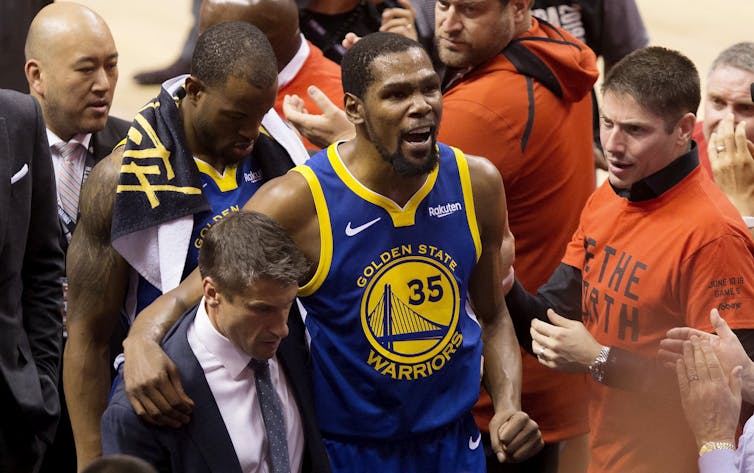
Jamie Gruman, University of Guelph
The Toronto Raptors have won their first NBA title in franchise history, and their star player, Kawhi Leonard, was crowned the most valuable player in the finals.
But just a year ago, Leonard’s career was plagued by injuries that caused him to miss almost the entire basketball season.
So when the Raptors acquired him in the summer of 2018, they put him on a regimen of what’s known as load management to ensure he was healthy and capable of performing at his best.
According to the International Olympic Committee, the goal of load management is to design loads, such as training and competition, to enhance performance while reducing the risk of injury. Essentially, load management helps athletes stay resilient in the face of the many relentless demands they face.
Each of us can apply load management in our lives to help promote our own resilience and success.
Most of us aren’t elite athletes focused on maximizing physical prowess. We are more likely to be employees, caregivers and students who are mainly focused on ensuring our mental competence. We therefore need to focus on our psychological load more than our physical load.
The psychological component of load management involves successfully handing the internal loads we face, like stress, that can interfere with our well-being and performance.
One of the ways to manage our psychological load and combat the stress of everyday obligations is to ensure that we enjoy an adequate amount of leisure time that allows for recovery. We also need to make sure that our time spent unwinding is of sufficient quality.
Ironically, though, it is precisely when our loads are most intense and our stressors most extreme that we are least likely to participate in activities that allow us to recover. This is known as the recovery paradox.
‘Turning off’
For example, one effective strategy for combating the stressors caused by our everyday experiences is to engage in psychological detachment, which involves mentally “turning off” from our daily obligations in our leisure time.
However, when we experience stressful job situations that involve deadline pressures, conflict at the office or emotional demands, we are less likely to psychologically detach in our leisure time. This adds to our load and prevents recovery.
Sleep is another method for helping us recuperate from our daily hassles. In fact, high-quality sleep is one of the most important recovery mechanisms there is. Unfortunately however, when we experience strain in our jobs due to things such as a lack of control over our work tasks, it interferes with the quality of our sleep and prevents recovery.
Lessons from Durant’s ordeal
A failure to engage in proper load management can have disastrous consequences. We saw this in Game 5 of the NBA Finals, when Golden State Warrior Kevin Durant, his team on the verge of elimination, laced up to try to help his squad live to fight another day despite nursing an injury to his right calf.
Tragically, however, in the second quarter of the crucial game, he ruptured his Achilles tendon and required surgery that may put him on the sidelines for the entire next season.

For those of us who are not professional athletes, participating in physical activities in our leisure time can be an effective source of unwinding that helps us manage our psychological load. Again, though, research shows that stressful experiences during our work or obligation time can lead us to engage in less exercise and other physical activities in our leisure time. This prevents us from recovering as successfully as we could.
Human beings are not machines. We can’t be on the go nonstop and expect to excel. For us to perform at our best we need to recover successfully from the numerous and persistent demands we face on a daily basis — just as Kawhi Leonard did during his months of load management.
This requires overcoming the recovery paradox and ensuring that we participate in leisure activities that help us recuperate, particularly when we experience high levels of stress.
Managing our psychological loads is an important part of enjoying a good life, ensuring our own resilience and performing at our best. The King in the North is a great example of how implementing load management can keep us physically and psychologically healthy and promote our ultimate success.
Jamie Gruman, Professor of Organizational Behaviour, University of Guelph
This article is republished from The Conversation under a Creative Commons license. Read the original article.

